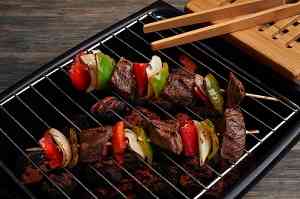BBQ FOOD SAFETY TIPS: Barbecuing safely starts with the basics.
Most of us have ‘sterile stomachs‘ compared to years gone by. That means we struggle to handle the crude or unrefined approach to food hygiene.
Barbecuing outside doesn’t require too much sterility. But, there are a handful of basic rules for grilling food to keep the bacteria at bay.
Raw meat contains germs and bacteria. Food bacteria double every 20 minutes in optimum conditions – called the ‘danger zone‘. They can cause an upset stomach or severe food poisoning in some cases.
Barbecue Food Poisoning Risks
Avoid the risks of barbecue food poisoning. Make sure that all raw meat gets grilled thoroughly. There are two specific risk factors to health when barbecuing meat outside:
- Consuming meat that is not cooked enough (undercooked).
- Cross-contamination of germs (spreading bacteria from raw meat to edible food).
You could consider the safest option of pre-cooking the food indoors first. Barbecuing the cooked food outside will then add that ‘just grilled‘ flavour. Cooking chicken, pork, sausages, burger, kebabs, and turkey means checking that:
- The cooked meat is piping hot all the way through to the middle.
- Any juices from the meat are running out clear (not red blood).
- No pinky meat is visible after cutting into the thickest flesh parts.
Note: Avoid leaving cooked food open to the air for longer than 2 hours (one hour if it’s hot weather outside). Always follow the fire safety tips for cooking barbecues on charcoal grills.
How to Cook Meat on a BBQ
 There are several food safety tips for barbecue cooking. Most outdoor BBQs will involve pork, chicken, burgers, sausages, or steak fillets.
There are several food safety tips for barbecue cooking. Most outdoor BBQs will involve pork, chicken, burgers, sausages, or steak fillets.
If you are going to cook meat on a BBQ make sure that:
- The coals glow red and show a powdery grey surface. That means the charcoal is hot enough to start cooking.
- Any frozen meat has thawed completely before cooking it.
- The meat gets turned regularly. Moving it around the smoker will produce an even cook.
Handling Raw Meat for Barbecues
It is important to handle raw meat for barbecues with caution. The germs in raw meat can transfer onto your hands. That means it is easy for the germs to spread further on to anything else that you touch.
The danger increases if germs spread to food that is already cooked and ready for consumption. This also applies to raw meat coming in contact with cooking utensils. Using the utensils on other food can also contaminate it with bacteria and germs.
Following these 6 simple steps will help to prevent spreading germs from raw meat used on barbecues:
- Always wash your hands thoroughly after touching raw meat products (e.g. chicken, pork).
- Use separate food utensils for raw meat and cooked (i.e. knives, tongs, plates, containers).
- Never place cooked food onto a plate or surface that had raw meats on it.
- Separate raw meats in sealed containers away from edible fresh foods (e.g. bread, fruit, salads).
- Never place raw meat close to cooked or partly-cooked meat grilling on the barbecue.
- Do not apply sauce or marinade to cooked food if it already got used with any raw meats.
Foodstuffs to Keep Cool
Keeping the following food types chilled or cool will also help prevent outbreaks of food poisoning:
- Salads, dips, and dairy products like cream, milk, and yoghurt.
- Most desserts such as cream cakes,
- Sandwiches (e.g. ham and other cooked meats).
- Cooked rice (including rice salads).
Family picnics are fun ways to eat cold packed meals in the garden or open countryside. Follow this picnic food safety advice to avoid spoiling the outing.

